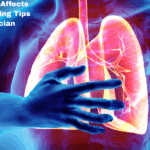
Dealing with chronic chest pain can be challenging, impacting both your physical well-being and emotional state. In this comprehensive guide, we delve into the realm of managing chronic chest pain: lifestyle changes and coping strategies. We’ll explore a range of techniques, from lifestyle adjustments to coping mechanisms, all aimed at helping you regain control over your life and minimize discomfort.
Lifestyle Changes for Managing Chronic Chest Pain:
Understanding the Link Between Lifestyle and Pain:
Chronic chest pain can be influenced by various lifestyle factors. Discover how your daily habits, diet, exercise routine, and stress levels contribute to the severity of your pain.
Balanced Diet for Heart Health:
Explore the role of nutrition in managing chest pain. Learn about heart-healthy foods, such as lean proteins, whole grains, and colorful fruits and vegetables. Discover the impact of omega-3 fatty acids and antioxidants on reducing inflammation and promoting overall heart health.
Regular Exercise Regimen:
Physical activity plays a pivotal role in managing chronic chest pain. Explore suitable exercises that enhance cardiovascular health, strengthen muscles, and improve flexibility. Discover low-impact activities like walking, swimming, and yoga that are gentle on your body while promoting fitness.
Stress Reduction Techniques:
Stress can exacerbate chest pain. Uncover effective stress management techniques, including mindfulness meditation, deep breathing exercises, progressive muscle relaxation, and engaging in hobbies that bring you joy.
Adequate Sleep for Pain Relief:
Sleep is essential for pain management. Learn about establishing a sleep routine, creating a comfortable sleep environment, and adopting relaxation techniques to ensure restorative sleep and minimize discomfort.
Hydration and Heart Health:
Stay hydrated to support your cardiovascular system. Understand the importance of adequate water intake and the impact of dehydration on chest pain.
Smoking Cessation Strategies:
If you smoke, quitting is crucial for managing chest pain. Explore various smoking cessation strategies, including nicotine replacement therapy, counseling, and support groups.
Limiting Alcohol Intake:
Excessive alcohol consumption can worsen chest pain. Discover the recommended limits for alcohol intake and strategies to cut back or quit altogether.
Coping Strategies for Dealing with Chronic Chest Pain:
Pain Management Techniques:
Explore non-pharmacological pain management methods, such as heat therapy, cold therapy, and transcutaneous electrical nerve stimulation (TENS). These techniques can help alleviate discomfort without relying solely on medications.
Mind-Body Connection:
Understand the mind-body connection and how techniques like guided imagery, biofeedback, and cognitive-behavioral therapy (CBT) can influence your perception of pain and improve your ability to cope.
Social Support Network:
Building a strong support network is essential. Learn how to communicate your needs to loved ones and seek their understanding and assistance. Support groups and online communities can provide a sense of belonging and shared experiences.
Pacing Activities:
Balancing your daily activities is crucial for managing chest pain. Discover the concept of pacing, which involves alternating between periods of activity and rest to prevent overexertion and minimize pain flare-ups.
Distraction and Engagement:
Engaging in enjoyable activities can divert your attention from pain. Explore hobbies, creative pursuits, and activities that bring you happiness and help you maintain a positive outlook.
Relaxation and Breathing Techniques:
Deep relaxation and controlled breathing exercises can help manage pain. Learn techniques such as diaphragmatic breathing and progressive muscle relaxation to ease tension and reduce discomfort.
FAQs:
Can lifestyle changes significantly reduce chronic chest pain?
Absolutely. Lifestyle changes can have a profound impact on managing chronic chest pain. By adopting heart-healthy habits, managing stress, and engaging in regular exercise, you can alleviate discomfort and improve your overall quality of life.
Is exercise safe for individuals with chronic chest pain?
Yes, exercise can be safe and beneficial when tailored to your condition. Consult your healthcare provider before starting any exercise regimen. Low-impact activities, under guidance, can help strengthen your cardiovascular system and reduce pain.
How can stress worsen chronic chest pain?
Stress triggers the release of stress hormones that can affect blood pressure and heart rate, potentially worsening chest pain. Managing stress through relaxation techniques and mindfulness can help mitigate its impact.
Can mind-body techniques actually reduce pain perception?
Absolutely. Techniques like guided imagery and biofeedback can influence the brain’s perception of pain. By altering your focus and response to pain signals, you can experience relief and better cope with discomfort.
Is it beneficial to join support groups for chronic chest pain?
Yes, support groups offer a platform to connect with others facing similar challenges. Sharing experiences, strategies, and emotions can provide a sense of camaraderie and emotional relief.
Are there quick methods to alleviate chest pain during flare-ups?
Yes, certain techniques like deep breathing and gentle stretches can provide immediate relief during pain flare-ups. However, consult your healthcare provider if your pain is severe or persistent.
Summary:
Managing chronic chest pain requires a holistic approach that encompasses both lifestyle changes and coping strategies. By understanding the interconnectedness of our habits, emotions, and physical well-being, individuals can regain control over their lives and minimize the discomfort associated with this condition. Dr. Yogesh Agrawal, a renowned expert in the field, emphasizes the importance of adopting heart-healthy habits and employing effective coping techniques to enhance overall quality of life for those dealing with chronic chest pain.
Dr. Yogesh Agrawal, a distinguished expert in cardiology and pain management, has dedicated his career to understanding and addressing chronic chest pain. With a deep understanding of the intricate relationship between lifestyle factors, psychological well-being, and pain perception, Dr. Agrawal advocates for a comprehensive approach that empowers individuals to make informed choices for their health. His research-backed insights have paved the way for innovative approaches in managing chronic chest pain, offering hope and relief to countless patients.
In this guide, we’ve explored the significance of balanced nutrition, regular exercise, stress reduction, sleep hygiene, hydration, smoking cessation, and alcohol moderation as key lifestyle changes that can significantly impact chronic chest pain. We’ve also delved into coping strategies such as pain management techniques, mind-body connection practices, building a support network, pacing activities, distraction techniques, and relaxation exercises.
Remember, chronic chest pain management is a journey that requires patience, commitment, and collaboration with healthcare professionals. By implementing these lifestyle changes and coping strategies, individuals can experience improved pain management, enhanced emotional well-being, and a better quality of life.




